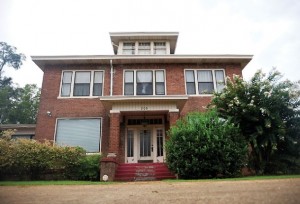Our final Brotherhood Breakfast will be relocated Sunday morning to a new ministry in the Golden Triangle called the “Last House on the Block,” that ministers to men struggling with addiction problems through Gospel ministry. We will meet there at 7:30am have breakfast fellowship with the men, hear a Word from the Scriptures, then go back to Woodland Baptist for our morning worship.
Please come if you can as we begin to cooperate with this much needed ministry.
‘Last House’ expansion provides key tool for sober living

The Last House on the Block, formerly the Masonic Temple building located at 206 Tuscaloosa Road in Columbus, will provide support for men completing drug and alcohol rehabilitation programs. Photo by: Sam Gause/Dispatch Staff
July 31, 2012 9:44:06 AM
Substance abuse and addiction can be debilitating, even life-threatening. It affects millions of Americans each year. But for men in Columbus who are combating addiction, more help is becoming available.
The Last House on The Block, a sober living environment, has grown from an eight-bed home in an East Columbus neighborhood to a new facility that will house 12 to 15 male residents once it’s completed.
“We’ve had some good success with our current home on King Street and we’ve gotten a lot of interest from people all over the state,” home spokesperson David Duett said. “So, we’ve been blessed to get a new home at 206 Tuscaloosa Road, which is the old Masonic Temple building. We were recently approved to have a halfway house in this building by the Columbus City Council, which was very supportive of what we are doing. We hope to have everything completed and start moving guys in by mid- to late September.”
The home is designed to provide additional support for men who have been through a minimum 30-day drug and alcohol program, either in a residential treatment facility or while being incarcerated.
“We have a six-month transitional program,” said Duett. “It is a 12 step-based program with daily devotionals. Our mission is to provide hope for alcohol and drug dependent men who desire to reclaim their integrity and their place in society. In a drug-free, structured environment, residents will develop spiritual and moral principles which will assist them in becoming productive citizens. This house is God’s house first, then it’s the community’s house and then it’s the guys’ house. We have gone through some similar things and we just want to help people like we were helped. We were given a chance and we just want to give that back to someone else.”
A halfway house for men in Lowndes County may fill a needed void in the community, said Michael Valentine, executive director of the Starkville-based Golden Triangle Recovery Center.
“Recovery is a lifelong process of growth which begins with a desire to change,” Valentine said. “In early recovery, people often need outside structure and for someone to provide accountability. Research shows that it takes about 90 days of treatment to create a lasting change. Unfortunately, with the recession, treatment centers have been shortening their programs to save money and keep functioning. Many programs have gone from providing 42 days of primary services to 28 days. People who finish these shorter programs often need on-going help or run the risk of relapse. Halfway houses help to bridge the gap between treatment and independent living by providing structure and accountability that would be lacking in a return to independent living.”
Duett said the community has been very supportive of the facility.
“The support we have received has been overwhelming,” said Duett. “We have received support and contributions from churches and individuals throughout the area. We are a non-profit organization. We have guys come to us that won’t even look us in the eyes when they first get here. A few months later, they are starting to smile and they are gainfully employed or seeing their family for the first time. We try to help these guys find jobs and live sober and get their lives back together. Our biggest reward is seeing someone turn their lives around and becoming happy, productive citizens. We do this because we want to help.”
“Halfway houses allow those in early recovery to venture out into the world, to hold a job, to visit with significant people in their lives and to return to a protected environment with supportive staff,” Valentine said. “Columbus is fortunate to have two such establishments.”
For more information on The Last House on the Block, call Duett at 662-574-9897, David Ikerd at 601-946-6681, Bradley Tate at 662-574-2074, Eddie Shaw at 662-549-2074 or Kevin Styron at 662-549-20

